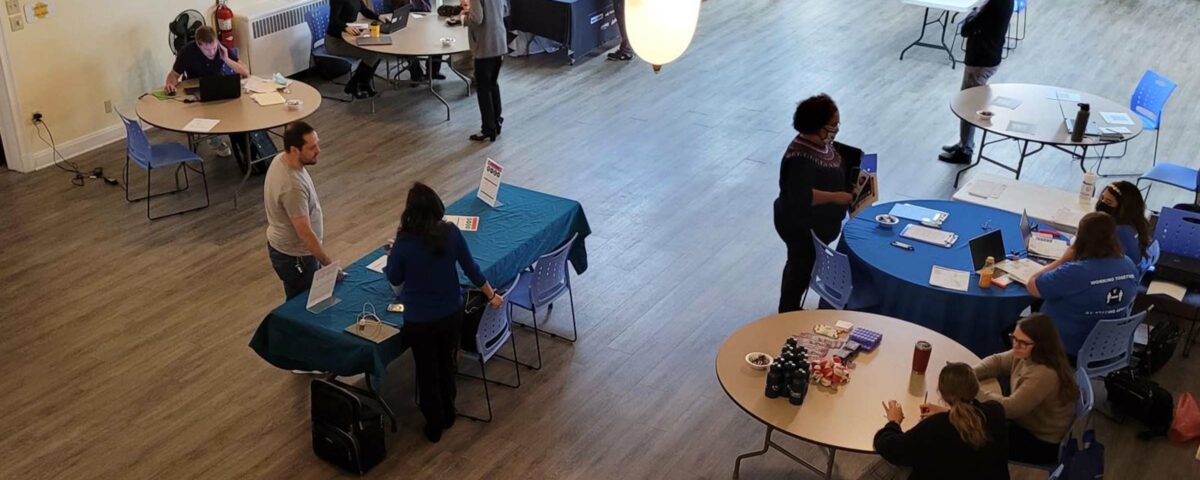James was ready to give up. He had gone from employer to employer with the hope of starting over, but each time he was told that his background check prevented him from starting the job. Most employers were impressed with him but were unable to offer him the position due to hiring policies around previously being incarcerated.
Would there be any hope of a job that would lead to an apartment, future security, and even the possibility of a family some day? Would judgement continue to follow him with every step outside of the prison walls?
A Harsh Reality
James’ story, not unlike many individuals in his situation, started with abandonment and rejection as a child. He learned quickly to trust no one as he was bounced from foster home to foster home. Running the streets and sadly turning to drugs, James was eventually arrested and sent to prison.
Our society has in many ways made it tremendously difficult for folks to re-enter into life beyond bars. A system that was supposed to be about correction, rehabilitation, and justice has for many become a system of revenge, restitution, and punishment.
Trying to rebuild a life after incarceration can be one of the most hopeless, lonely, and seemingly impossible journeys. As men and women complete their prison sentence, they are basically released with nothing but the clothes on their back and the little bit of money they may have set aside. Most do not have a home to return to and end up sleeping on the couches of friends and family until they have outstayed their welcome.
Through all of it they look for work, but job applications require a permanent address, which many do not have after being released from prison. Securing a phone following incarceration can also be a challenge, making it hard for employers to get in touch to schedule interviews.
Even if they do get an interview, many businesses state in their hiring policy that they will not or cannot hire someone with a felony charge, regardless of when the charge occurred or the circumstances surrounding it. Individuals like James who have a number of charges against them are limited in their career choices. It is a vicious situation that perpetuates the cycle of re-entering into the prison system once again.
Compassionate Justice
The Church however is a people who have personally experienced the compassionate justice of God. Salvation, redemption, and reconciliation are God’s provision to a people who have all sinned and fallen very short of the glory of God.
Jesus was all about bringing healing and freedom to the captive. Proclamations of freedom for the prisoner bookend Jesus’ ministry. As he opened the scroll in the synagogue at the beginning of his ministry, he read from Isaiah 61:1 – “He has sent me to proclaim freedom for the prisoners.” As Jesus hung on the cross, he spoke freedom for the prisoner that was being executed next to him.
How does the church intersect with the judicial system? How is the church walking with and loving those who have been incarcerated?
A Fair Chance

People attend a re-entry job fair at New Life Community Church in Carlisle, Pa.
New Life Community Church (NLC) in Carlisle, Pa. is a diverse family of Christ followers seeking to live out the love, acceptance, healing, and hope of Jesus seven days a week. Many who call NLC home have been in prison, stood before a judge, or been assigned a parole officer.
When NLC saw the realities that many people in James’ position face, they saw an opportunity to extend Jesus’ love and compassion to an entire group of people that were often overlooked. In October 2021, they partnered with Cumberland County Adult Parole and Probation and CareerLink to host a re-entry job fair.
Eighteen local companies who were willing and able to hire those with criminal backgrounds participated and offered onsite applications, interviews, and hiring. Out of the fifty individuals who attended the event, fifteen individuals walked out that day with a job offer. Everyone else had interviews and information in hand as they walked out the door of the church.
People who had come to the job fair feeling defeated left with smiles that signaled a resurrected hope: a hope that maybe rejection was finally a thing of the past, a hope that they could be independent from the system they had relied on, and a hope that their families and friends would now see them become who they were created to be. James was one of those people who walked away with a job that day. He also walked away with dignity, confidence, and a deeper sense of acceptance.
Fanning the Flame of Hope
The job fair was eye-opening for the NLC team as they recognized the lack of support available for people in the re-entry process. Soon after, NLC partnered with another community organization to launch a re-entry support group where individuals can ask questions, find support, and be encouraged and challenged to take the next right steps.
Churches can make a huge impact for those re-entering their community, even though the magnitude of the situation can sometimes feel paralyzing. Start with building relationships. Sit down with someone who has experienced incarceration and listen to their story. Find out the challenges of their journey and where the Church could have been helpful. Local law enforcement and parole officers can also be a great resource when trying to identify areas of need.
We tend to complicate the next steps and want to over-program everything. Instead, look for strategic ways to meet simple needs and fill common gaps experienced by the re-entry community. Through practical opportunities like job fairs and support groups, people can see the Church not just as a building but as a people who demonstrate the love of Jesus through a cup of coffee, a simple handshake, and a word of congratulations. It is in Christ’s body, the Church, where hope is kept alive and fanned into flame.
Names changed for confidentiality.


